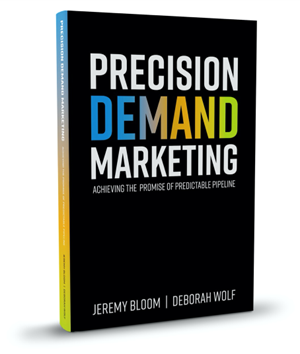We spoke to Deb Wolf who was previously CMO at Integrate and is a 3-time Integrate customer, about a new book she has co-authored on the challenges of marketing in an increasingly complex and uncertain world.
Precision Demand Marketing: Achieving the Promise of Predictable Pipeline, was co-authored by Deb with Integrate’s co-founder and CEO, Jeremy Bloom.

Could you tell us about the topic of the book, precision demand marketing?
Our company point of view is really that the B2B market shifted, and that this shift was going on pre-COVID.
It was accelerated during the pandemic by the buyer. While marketers and sellers have had this convenient way of talking about their buyer journeys and their frameworks for getting to those buyers, what content to use and how the seller or the salesperson is going to pick it up etc, this just isn’t the case.
B2B buyers are so much more like B2C buyers today. Sure they're buying for their company and they're often in a larger buying group and they don't have the one click option, or perhaps the authority to sign it off that you have when you're shopping for a new pair of tennis shoes, but their expectations are the same.
Their expectations are that you're going to know who I am, you're going to give me the right kind of content that I want to consume. It doesn't really matter where I find you if I find you in social media, or if I find you in a webinar or if I find you in content syndication or I see you in a display ad.
So this shift to what we call a very buyer-centric world has happened. We saw it happening digitally pre-pandemic and then it accelerated. I mean, we don't even have seller

s sitting in front of, or meeting their customers anymore.
My sellers begged me to come to an event because it's the only time they actually get to shake their buyers’ or their customers’ hands. And they don't go to their offices anymore because our buyers are everywhere.
So that monumental shift led to our thinking about how marketers address this. What do they think about it? What are the things they need to do?
We wrote the book and we wanted to write a very practical book. We did not want to write a high level, top down book and we broke it into five areas. We liken these areas to five buying jobs for marketers.
They really need to target their customers. They need to activate those customers and campaigns, whatever channels they may be in. They need to govern the data that comes back so that when the relationship starts they're having a relationship with someone they actually know and understand, rather than ‘dear first name. ’ They need to connect the technology that runs all of that, and then they need to measure the results of those campaigns so they know how things are performing, and ultimately how to defend that spend with the rest of their organisation.
So those are the five key chapters that we explore in the book, and again, in really practical terms, how B2B marketing teams can stay at the heart of the organisational structure or the technology that's within the business.
Often, I see marketing teams really struggling with this idea because they're very siloed. They do events, demand generation, webinars, syndication, social media etc.
What they sometimes forget is the buyer who's interacting with your brand and that the experience for the buyer should be seamless.
The thing I think I'm most proud of in the book is the customers and B2B marketers who have shared their stories. We've been very lucky to work with some of those really wonderful marketers to help tell the story.
Given what’s happened in the last two years, how has the book had to change during the process of writing?
It's really been a two year labour of love. As I said to somebody yesterday, the speed at which this market moves is so quick the minute you think it's finished, you either need to write another one or make some edits, as B2B marketers are constantly on edge and changing and as markets shift rapidly.
We had jobs that went away, right? We have an event manager, field marketers whose job really went away overnight, and budgets had to shift from in-person events to digital.
One of the things we've talked about in the book is a marketing maturity curve where at the lowest level there are four stages of that marketing maturity curve, and at the lowest level is a very immature company that uses what we call ‘ random acts of marketing’.
At the highest level is this idea around precision demand where you're really connecting to your buyer and providing them with what they need. So if you think about that shift that we had from just from an events perspective, we saw these ‘random acts of marketing’ where budgets were shifted quickly. Marketers needed leads, and they needed them quickly.
Now as they now come out of the pandemic and they start really thinking about strategy, it’s not about picking up what we did in 2019 and starting over again.
Instead, marketers need to think about how they use budgets in a way that will address buyers in what is now a very digital world.
Do marketers now have to think more about integrating physical and digital in areas such as events?
Yes, events are coming back, and buyers want to be there but I still need to think about how I'm bringing that event into the customer journey, how does it fit within this journey?
We've tried to bring that event-like event focus back in. It really starts I think with three core areas that our marketing team has to address.
One is what's the organisation look like? Do I have my teams working on campaigns and programmes to address the buyer's needs? Or are they working in siloed parts of the organisation and how do I get them out of those specific silos?
How do I evaluate my technology to address the buyer's needs so that I'm not trying to stitch a bunch of pieces together? Do I have a lot of overlapping technology? Are there things that I can redeploy?
And third, how do I think about my strategy? Am I aligned with my selling organisation? Can my sales organisation actually communicate with the marketing team, and are they in sync with what marketing is trying to do? Can we share goals around those kinds of things?
When you think about how these teams have had to shift during the pandemic, and they’ve picked up new skills we're coming back, but marketers picked up new skills, new things to do in the organisation. Some of them became ABM- focused demand marketers for example.
I think a marketing team really has to look at those three areas of technology and strategy to address that buyer-centric view. Marketers have been guilty of buying a lot of technology that solves a simple single thing, but what’s harder is to understand that, because our buyers are in so many channels, you have to be able to use the technology to create a cross-channel or an omnichannel way to attract your buyers. Those elements need to be able to stitch together so you can have those different channels perform.
What career advice would you give to B2B marketers?
I have a mentor and it's not somebody who's sort of other than me, it's somebody who's 20 years younger than me because I didn't grow up as a digital native, right? When I call my mentor I say, I don't know what's going on here.
You have to remember that something like 30 or 40% of our buyers are digitally based and so the advice I would give people is to spend time with your customers and you don't have to do that sitting across the table from them or sitting across the zoom with them.
You can follow their behaviours as they are interacting with you as a brand, what they're liking or doing on your social pages or your events.
I think sometimes we as marketers, this is not just today but for years we've ever looked up right? As B2B marketers, we don't think about our buyers that way. We forget that they're normal people that buy so that's I think that's the advice I would probably give.
Order your free copy of the book and learn how to shift your approach to meet your buyers’ needs with precision. After all, it’s high time that B2B marketing got easier.
